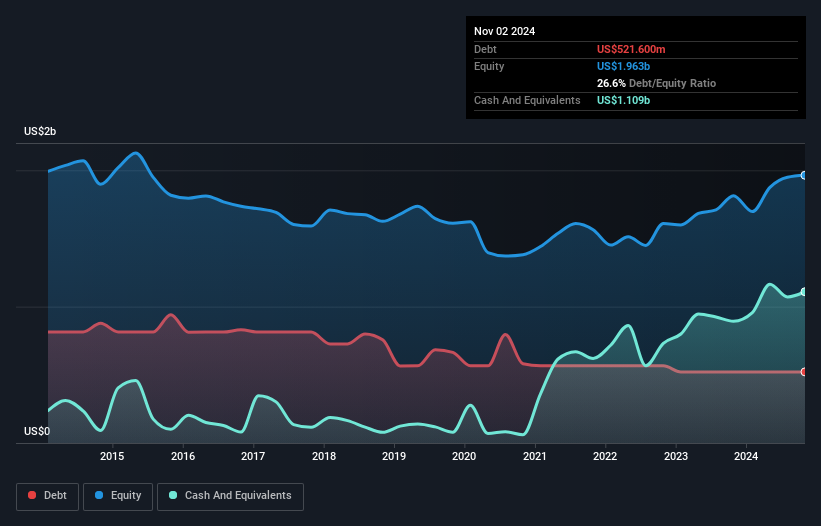These 4 Measures Indicate That Dillard's (NYSE:DDS) Is Using Debt Reasonably Well
Warren Buffett famously said, 'Volatility is far from synonymous with risk.' So it seems the smart money knows that debt - which is usually involved in bankruptcies - is a very important factor, when you assess how risky a company is. We can see that Dillard's, Inc. (NYSE:DDS) does use debt in its business. But the more important question is: how much risk is that debt creating?
Why Does Debt Bring Risk?
Debt and other liabilities become risky for a business when it cannot easily fulfill those obligations, either with free cash flow or by raising capital at an attractive price. Ultimately, if the company can't fulfill its legal obligations to repay debt, shareholders could walk away with nothing. However, a more frequent (but still costly) occurrence is where a company must issue shares at bargain-basement prices, permanently diluting shareholders, just to shore up its balance sheet. Of course, the upside of debt is that it often represents cheap capital, especially when it replaces dilution in a company with the ability to reinvest at high rates of return. The first thing to do when considering how much debt a business uses is to look at its cash and debt together.
View our latest analysis for Dillard's
How Much Debt Does Dillard's Carry?
The chart below, which you can click on for greater detail, shows that Dillard's had US$521.6m in debt in November 2024; about the same as the year before. However, it does have US$1.11b in cash offsetting this, leading to net cash of US$587.7m.

How Healthy Is Dillard's' Balance Sheet?
According to the last reported balance sheet, Dillard's had liabilities of US$1.24b due within 12 months, and liabilities of US$933.0m due beyond 12 months. Offsetting these obligations, it had cash of US$1.11b as well as receivables valued at US$61.7m due within 12 months. So its liabilities outweigh the sum of its cash and (near-term) receivables by US$998.7m.
Of course, Dillard's has a market capitalization of US$7.07b, so these liabilities are probably manageable. However, we do think it is worth keeping an eye on its balance sheet strength, as it may change over time. While it does have liabilities worth noting, Dillard's also has more cash than debt, so we're pretty confident it can manage its debt safely.
But the bad news is that Dillard's has seen its EBIT plunge 19% in the last twelve months. We think hat kind of performance, if repeated frequently, could well lead to difficulties for the stock. When analysing debt levels, the balance sheet is the obvious place to start. But it is future earnings, more than anything, that will determine Dillard's's ability to maintain a healthy balance sheet going forward. So if you're focused on the future you can check out this free report showing analyst profit forecasts.
But our final consideration is also important, because a company cannot pay debt with paper profits; it needs cold hard cash. While Dillard's has net cash on its balance sheet, it's still worth taking a look at its ability to convert earnings before interest and tax (EBIT) to free cash flow, to help us understand how quickly it is building (or eroding) that cash balance. Over the last three years, Dillard's recorded free cash flow worth a fulsome 81% of its EBIT, which is stronger than we'd usually expect. That puts it in a very strong position to pay down debt.
Summing Up
While Dillard's does have more liabilities than liquid assets, it also has net cash of US$587.7m. The cherry on top was that in converted 81% of that EBIT to free cash flow, bringing in US$669m. So we don't have any problem with Dillard's's use of debt. When analysing debt levels, the balance sheet is the obvious place to start. But ultimately, every company can contain risks that exist outside of the balance sheet. For instance, we've identified 1 warning sign for Dillard's that you should be aware of.
If you're interested in investing in businesses that can grow profits without the burden of debt, then check out this free list of growing businesses that have net cash on the balance sheet.
New: Manage All Your Stock Portfolios in One Place
We've created the ultimate portfolio companion for stock investors, and it's free.
• Connect an unlimited number of Portfolios and see your total in one currency
• Be alerted to new Warning Signs or Risks via email or mobile
• Track the Fair Value of your stocks
Have feedback on this article? Concerned about the content? Get in touch with us directly. Alternatively, email editorial-team (at) simplywallst.com.
This article by Simply Wall St is general in nature. We provide commentary based on historical data and analyst forecasts only using an unbiased methodology and our articles are not intended to be financial advice. It does not constitute a recommendation to buy or sell any stock, and does not take account of your objectives, or your financial situation. We aim to bring you long-term focused analysis driven by fundamental data. Note that our analysis may not factor in the latest price-sensitive company announcements or qualitative material. Simply Wall St has no position in any stocks mentioned.
About NYSE:DDS
Dillard's
Operates retail department stores in the southeastern, southwestern, and midwestern areas of the United States.
Flawless balance sheet established dividend payer.
Similar Companies
Market Insights
Community Narratives



